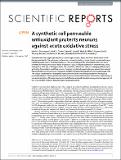Files in this item
A synthetic cell permeable antioxidant protects neurons against acute oxidative stress
Item metadata
| dc.contributor.author | Drummond, Nicola | |
| dc.contributor.author | Davies, Nick | |
| dc.contributor.author | Lovett, Janet Eleanor | |
| dc.contributor.author | Miller, Mark | |
| dc.contributor.author | Cook, Graeme | |
| dc.contributor.author | Becker, Thomas | |
| dc.contributor.author | Becker, Catherina | |
| dc.contributor.author | McPhail, Donald | |
| dc.contributor.author | Kunath, Tilo | |
| dc.date.accessioned | 2017-09-25T11:30:14Z | |
| dc.date.available | 2017-09-25T11:30:14Z | |
| dc.date.issued | 2017-09-19 | |
| dc.identifier | 251025634 | |
| dc.identifier | a96b9303-ff79-4934-aa3d-be89461b96a8 | |
| dc.identifier | 85029872869 | |
| dc.identifier | 000411165100034 | |
| dc.identifier.citation | Drummond , N , Davies , N , Lovett , J E , Miller , M , Cook , G , Becker , T , Becker , C , McPhail , D & Kunath , T 2017 , ' A synthetic cell permeable antioxidant protects neurons against acute oxidative stress ' , Scientific Reports , vol. 7 , 11857 . https://doi.org/10.1038/s41598-017-12072-5 | en |
| dc.identifier.issn | 2045-2322 | |
| dc.identifier.other | ORCID: /0000-0002-3561-450X/work/40301302 | |
| dc.identifier.uri | https://hdl.handle.net/10023/11736 | |
| dc.description | Funding: Royal Society University Fellowship and grant (RF 120645) (JEL). | en |
| dc.description.abstract | Excessive reactive oxygen species (ROS) can damage proteins, lipids, and DNA, which result in cell damage and death. The outcomes can be acute, as seen in stroke, or more chronic as observed in age-related diseases such as Parkinson’s disease. Here we investigate the antioxidant ability of a novel synthetic flavonoid, Proxison (7-decyl-3-hydroxy-2-(3,4,5-trihydroxyphenyl)-4-chromenone), using a range of in vitro and in vivo approaches. We show that, while it has radical scavenging ability on par with other flavonoids in a cell-free system, Proxison is orders of magnitude more potent than natural flavonoids at protecting neural cells against oxidative stress and is capable of rescuing damaged cells. The unique combination of a lipophilic hydrocarbon tail with a modified polyphenolic head group promotes efficient cellular uptake and moderate mitochondrial enrichment of Proxison. Importantly, in vivo administration of Proxison demonstrated effective and well tolerated neuroprotection against cell loss in a zebrafish model of dopaminergic neurodegeneration. | |
| dc.format.extent | 12 | |
| dc.format.extent | 7944025 | |
| dc.language.iso | eng | |
| dc.relation.ispartof | Scientific Reports | en |
| dc.subject | QH301 Biology | en |
| dc.subject | RC0321 Neuroscience. Biological psychiatry. Neuropsychiatry | en |
| dc.subject | NDAS | en |
| dc.subject.lcc | QH301 | en |
| dc.subject.lcc | RC0321 | en |
| dc.title | A synthetic cell permeable antioxidant protects neurons against acute oxidative stress | en |
| dc.type | Journal article | en |
| dc.contributor.sponsor | The Royal Society | en |
| dc.contributor.sponsor | The Royal Society | en |
| dc.contributor.institution | University of St Andrews. School of Physics and Astronomy | en |
| dc.contributor.institution | University of St Andrews. Biomedical Sciences Research Complex | en |
| dc.identifier.doi | 10.1038/s41598-017-12072-5 | |
| dc.description.status | Peer reviewed | en |
| dc.identifier.grantnumber | UF150698 | en |
| dc.identifier.grantnumber | UF090121 | en |
This item appears in the following Collection(s)
Items in the St Andrews Research Repository are protected by copyright, with all rights reserved, unless otherwise indicated.

